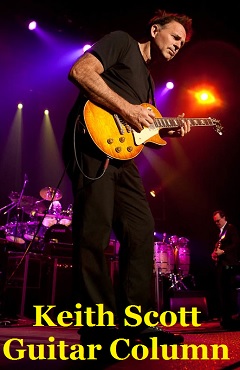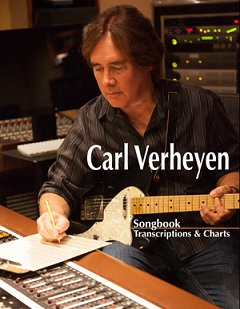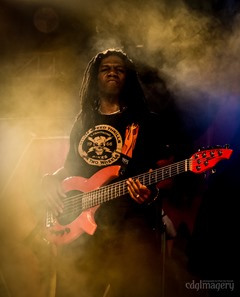
Greetings from Germany!
It’s Philip Bynoe on the road with the band Warlord.
Most of you know me as one of the many bass players from the Steve Vai band, but when he’s on break or busy with other things (now he is on an orchestral tour), I have time to do other projects.
Prep for Touring
Before I take the stage with any artist I learn the material. For me that process is as follows. First I listen to the music without my bass and pay close attention to the feel of the songs, the form of the songs and all the details I can digest. Next I write charts. It’s an important step because writing the parts out I begin memorizing. Then I get to playing them on the bass.
I look for the best fingering and try to emulate the sound from the recording. I will then schedule a time every day to play the songs and–this is key–I commit to do it when I say I will. It’s important that you make the time and stick with it. You’ll learn faster and pay greater attention to detail. Of course, the number of songs I have to learn will determine when I start and how long I will allow myself to play.
Okay, so now I’m ready to rehearse with the band.
I always bring my charts with me, even if I have memorized the material, just in case there’s a change or maybe the artist wants something different than is on the recording. If there’s an ending added on to a song, or parts are extended or changed, I can notate it on my chart for future reference.
Also, I bring a recording device with me to rehearsal. Having a copy of what you’re doing together helps out greatly after rehearsal when you want to go over what was covered.
As a side note, a good attitude is a very important piece to have in your tool box. People like working with others who are fun to be around and show interest in what they’re doing. I’m not saying to fake it, but you’ll have more fun and work a lot more if people know you as a pro who takes time to prepare and brings joy to his or her work.
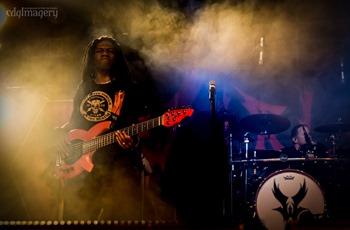
Now your act is assembled and it’s time for the show.
If you’re using your own amp for the gig then your sound is already set. But on some of the shows I do, backline and/or amps are supplied for you. And when this is the case, you must dial in your sound quickly.
Here are my steps to do this:
1. I make sure all the basics are covered: the amp is plugged in, the speaker cable is in place and things will turn on. I know it sounds routine, but if you are thorough you won’t get tripped by something simple.
2. I plug the bass directly into the amp. No pedals or effects. Just amp, cable and bass. I like to set everything to flat eq wise then bring up the level. Remembering that the amp sounds completely different from 5 to 10 feet away, I will try not to boost the low end too much. Just try to achieve an even sound that I can turn up louder if I need to and can also play at a lower volume and still sound good.
3. I then plug in a pedal board and any effects I’ll use for the show. I check the sound to the front of house or in the P A. If you have bass in the monitors once you have your bass amp sounded you can then bring the bass up in the monitors again. Pay attention to the balance between the amp and monitors. If things get too loud on stage, bass can be tough to deal with. If it sounds good to you it might be too loud, so be careful. I prefer to keep the bass out of the monitors and just in the amp. Then I have control over it completely. Most front of house, or sound engineers as they like to be called, will tell you to get your sound and they will work with you. The best advice I can give is get your stage volume down as low as you can comfortably play with. That way the sound guy can turn you up in the main a lot more, which will translate into a bigger sound for you.
4. As for warming up, everyone is different. I have friends who carry a small amp and they will play for a half hour to an hour before the show. I’ve used a program called AmpliTube, it’s an app for iPad and iPhone. You can use a converter and plug your bass into the device and with headphones you can play and warm all you want. As for what I play, it’s usually the songs I’m about to play that evening, just to keep everything fresh in my mind. I also take ten minutes or so to quietly meditate so I can focus on the task at hand. I sit in a chair with both feet on the ground close my eyes and try to clear my mind and just be in the moment. As a musician, my goal is to play and go from moment to moment. Not to focus on mistakes or what someone else might be thinking. I just try to every second on stage. I’m not saying that mistakes are okay, but we all make them. A note here or there should not ruin a whole gig, but it can! I know because I’ve done that too. So, now that I’m warmed up, I get myself dressed and wear comfortable shoes as I’ll be standing up there and don’t want anything minor steal my focus.
5. Finally, my instrument. I’ve used a number of different things in my career as a bassist– from keyboard bass to ukulele bass–to get the right sound for the show. With Steve Vai I have a pedal board with some effects on it for certain sounds. If you look on my gear page at www.philipbynoe.com, you will see my latest pedal board. I have a Morley volume distortion pedal, which I use for volume swells; a Morley A/B box which is for going between basses; a TC electronics MoJo distortion pedal for a nice and punchy distortion; a TC electronics poly tuner; a TC electronics corona chorus pedal; a Boss bass synth pedal for a funky synth sound; and a Line 6 wireless transmitter. It’s all powered by a G-lab power supply. I use these pedals to get the sounds I need while playing in Steve’s band. I am currently on tour with the band Warlord–and for this band I use no pedals. Always make sure to use what a gig calls for. I play with an artist named Steve Fister and with his band it’s all different pedals and sometimes upright bass. And with Jambo, a kids band, I play ukulele bass.
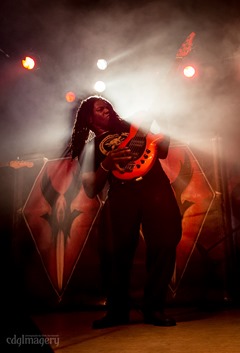
I’ve found the best cure for nervousness is preparation. If you’re concerned about your show then get to know your music back to front. A good friend of mine told me you can’t have a bad gig if you are prepared. And I agree.
So in closing, I hope this gives some insight into my world as a musician. By all means prepare for your gigs and you will have fun–and you will be called back. Doing music for a living is very challenging, so try to make yourself the best choice for any gig. And that way you’ll play for a living and love what you do.
Philip Bynoe
http://www.philipbynoe.com/
